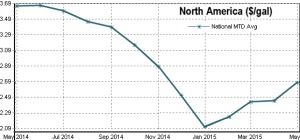It’s been awhile since the cost of gasoline topped $4 in the U.S. The national average hit $4.11 on July 11, 2008 and came close in May 2011 at $3.96. On New Years Day 2015, I drove through the night from Chicago to Boston. Despite the cold weather, the economics of fuel made it the best day for a road trip in years. I bought gas at a Pilot service station just off the Ohio Turnpike at $1.92/gallon. For me, it seemed like a bargain. Yet, 23 states charge less for gasoline than Ohio.
 Now, at the end of May 2015, gas is rebounding from that low. Drivers on Memorial Day weekend faced the highest cost for gasoline of the year so far.
Now, at the end of May 2015, gas is rebounding from that low. Drivers on Memorial Day weekend faced the highest cost for gasoline of the year so far.
It’s tempting for politicians to advocate using tax breaks to smooth price spikes. With energy often surpassing the expense of food and rent and with so many individuals using fuel to make a living, reducing user fees or taxes during periods of very high fuel cost seems like the humane thing to do.
It seems humane, but it has the opposite effect. In fact, it is deeply punitive! That’s because the cost of gas is not an act of nature, nor even of free market economics. It is a product of cartels, special interests, conflict and FUD (fear, uncertainty and doubt). Offering relief during price spikes sustains demand while doing absolutely nothing to increase supply. This, in turn, exacerbates the spike, creates shortages for critical services and transfers enormous sums of money from consumers to producers. In effect, it is a free gift for producer nations.
Continue reading “Increase Gas Tax as Cartel Price Rises” »
















